 | |
Native name | オリエント時計株式会社 |
|---|---|
Romanized name | Oriento Tokei Kabushiki-gaisha |
| Type | Division |
| Industry | Watch Manufacturing Electronics Manufacturing |
| Founded | July 13, 1950 Hino, Tokyo, Japan |
| Founder | Shogoro Yoshida |
| Headquarters | 29th Floor JR Shinjuku Miraina Tower, 4-1-6 Shinjuku, Shinjuku-ku, Tokyo 160-8801, Japan[1] |
Area served | Worldwide |
Key people | Jiro Miyagawa (President) Masahiro Yoshimura (Director) Takahiro Naito (Director) |
| Products | Wristwatches, Pocketwatches, Clocks, Moving Parts, Electronic Components |
| Services | Electronic Devices Assembly |
| Total assets | |
Number of employees | 747 (530 consolidated and 217 Non-consolidated) (2016)[1] |
| Parent | Epson (2001-present) |
| Website | www |
Orient (オリエント時計株式会社, Oriento Tokei Kabushiki-gaisha) is a Japanese watch manufacturer founded in 1950. Established as an independent company in 1950, it became a functional subsidiary of Epson in 2009 before being fully integrated into the company in 2017.[3]
Until it was absorbed into Epson, the Orient Watch Company had primarily marketed mechanical watches (self-winding & hand-winding),[4][5] but also produced quartz, light-powered (solar) and radio-controlled models.[6][7][8][9] Outside of the main business, the company produced some moving parts and electronic components that were then assembled into Seiko Epson's electronic devices.[10]
Currently, Akita Epson Corporation (formally Akita Orient Precision Instruments Co., Ltd.), a group company of Epson, manufactures all of the Orient movements in-house in Yuzawa, Akita, Japan.[11][12][13]
History
The origin of Orient Watch Company dates back to 1901 when Shogoro Yoshida opened a wholesale shop called "Yoshida Watch Shop" in Ueno, Taito, Tokyo, Japan. Yoshida Watch Shop was successful, selling imported pocketwatches. In 1912, Yoshida expanded his business and began producing gold wristwatch cases. In 1920, Toyo Tokei Manufacturing was established, originally producing table clocks and gauges. It was not until 1934 that Toyo Tokei Manufacturing started the production of wristwatches. In 1936, the Hino factory was built in Hino, Tokyo, Japan. For several years, Toyo Tokei Manufacturing boomed at the Hino factory. However, the company shut down in 1949 in the Japanese economic devastation following World War II.[14]
After Toyo Tokei Manufacturing was shut down, Yoshida's wristwatch manufacturing company was reborn in 1950, founded under the name Tama Keiki Company. Tama Keiki Co. continued manufacturing watches at the Hino factory. In 1951, Tama Keiki Co. changed its name to Orient Watch Company, Limited (オリエント時計株式会社, Oriento Tokei Kabushikigaisha), and in the same year the first Orient Star went on sale. Orient Watch was able to expand their visibility overseas after a memorandum trade agreement with China in 1955. The Royal Orient went on sale in 1960. Other important watches in the company's history include the "Dynamic" in 1956, "Grand Prix 100" in 1964, "Fineness" (the world's thinnest automatic wristwatch with day and date calendar function for its time) in 1967, and the "Tenbeat" in 1970.[15]
In 2003, the Orient Technical Center (OTC) was established and the assembly of luxury watches began in Ugo, Ogachi, Akita, Japan.[11] In 2004, the high-precision caliber 88700 movement went on sale via the Royal Orient watch line. In 2005, Orient Star Retro-Future collection was launched. In 2010, Orient Watch Co. celebrated its 60th anniversary with a limited edition model.[15] The Royal Orient line was discontinued around 2016, likely to prevent cannibalism between it and fellow Seiko group brands Grand Seiko, and Credor. To celebrate 70 years of the Orient Star line, the Orient Star skeleton watch was introduced with a silicon escapement made using Epson's MEMS technology, which has been used in high end Seiko watches since 2009.[16][17]
In 2001 Seiko Epson (one of three core companies of the Seiko Group) became the majority shareholder (52%) of the company. Orient Watch became a wholly owned subsidiary of Epson in 2009.[14] After transferring its business to Epson, the company now exists as a dormant company. Epson Sales Japan Corporation markets the Orient watches, while Akita Epson Corporation manufactures them.
Gallery
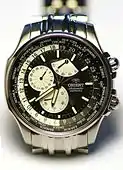 Orient (CEY04002B)
Orient (CEY04002B)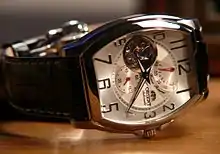 Orient (CFHAA004W)
Orient (CFHAA004W)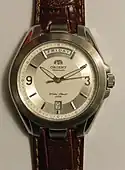 Orient
Orient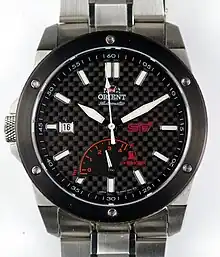 Orient x STI Collaboration 2010 (FD0H001B)
Orient x STI Collaboration 2010 (FD0H001B)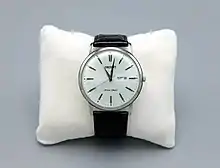 Orient Capital (FUG1R003W9)
Orient Capital (FUG1R003W9)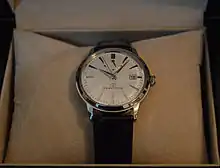 Orient Star - Classic (SEL05004W0)
Orient Star - Classic (SEL05004W0).jpg.webp) Orient Three Stars
Orient Three Stars
References
- 1 2 "Epson Begins Discussions on the Restructuring of Orient Watch". global.epson.com. Retrieved 23 February 2022.
- 1 2 "オリエント時計株式会社 第96期決算公告". catr.jp. Retrieved 23 February 2022.
- ↑ Staff writer (September 2016). "Seiko Epson: Epson Begins Discussions on the Restructuring of Orient Watch". MarketScreener. Surperformance.
- ↑ Message From the President of Orient Watch Company Archived 2017-02-28 at the Wayback Machine, Accessed 28 September 2014
- ↑ Explanations of Mechanical Movement by Orient Watch, Accessed 30 September 2014
- ↑ List of Orient Watch Product (Global Market), Accessed 28 September 2014
- ↑ List of Orient Watch Manual & Movement (Global Market), Accessed 28 September 2014
- ↑ List of Orient Watch Product (Japan Domestic Market), Accessed 28 September 2014
- ↑ List of Orient Watch Manual & Movement (Japan Domestic Market), Accessed 28 September 2014
- ↑ Orient Watch Factory History Archived 2016-11-07 at the Wayback Machine, Accessed 28 September 2014
- 1 2 Orient Watch Factory Profile Archived 2014-10-08 at the Wayback Machine, Accessed 28 September 2014
- ↑ Orient Watch Production Process (Video), Accessed 29 September 2014
- ↑ Orient In-house Automatic Movement Assembly (Video), Accessed 30 September 2014
- 1 2 Company history Archived 2012-01-10 at the Wayback Machine, Orient Watch. (in Japanese). Accessed 20 December 2009
- 1 2 Orient Watch Museum Archived 2014-09-11 at the Wayback Machine, Accessed 20 December 2009
- ↑ "The ORIENT STAR Skeleton | ORIENT Watch Global Site". orient-watch.com. Retrieved 2022-03-22.
- ↑ "グランドセイコーは"9Sキャリバー"で時計王国スイスに挑む! | トケイ通信 by KOMEHYO". 高級時計・ブランド時計にまつわる情報マガジン|トケイ通信 by KOMEHYO. 2017-03-10. Retrieved 2022-03-22.